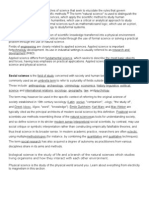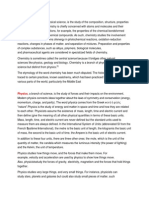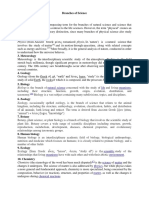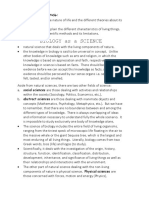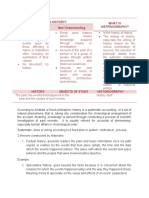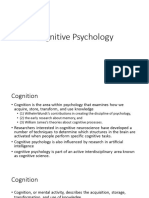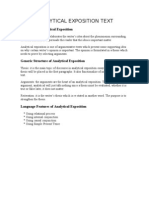Science
The word Science comes from Latin word "scientia" meaning "knowledge" and in the broadest sense
it is any systematic knowledge-base or prescriptive practice capable of resulting in prediction.
Science can also be understood as a highly skilled technique or practice.
In more contemporary terms, science is a system of acquiring knowledge based on the scientific
process or method in order to organize a body of knowledge gained through research.
Science is a continuing effort to discover and increase knowledge through research. Scientists make
observations, record measureable data related to their observations, and analyze the information at
hand to construct theoretical explanations of the phenomenon involved.
The methods involved in scientific research include making a hypothesis and conducting experiments
to test the hypothesis under controlled conditions. In this process, scientists publish their work so
other scientists can repeat the experiment and further strengthen the reliability of results.
Scientific fields are broadly divided into natural sciences (the study of natural phenomena) and social
sciences (the study of human behavior and society). However, in both these divisions, knowledge is
obtained through observation and must be capable of being tested for its validity by other researchers
working under similar conditions.
There are some disciplines like health science and engineering that are grouped into interdisciplinary
and applied sciences.
Most scientific investigations use some form of the scientific method. The scientific method tries to
explain the events of nature in a reproducible way, eventually allowing researchers to formulate
testable predictions.
Scientists make observations of natural phenomenon and then through experimentation they try to
simulate natural events under controlled conditions. Based on observations, a scientist may generate
a model and then attempt to describe or depict the phenomenon in terms of mathematical or logical
representation.
Scientist will then gather the necessary empirical evidence to generate a hypothesis to explain the
phenomenon.
This hypothesis is used to form predictions which in turn will be tested by experiment or observations
using the scientific method. Statistical analysis is commonly used to interpret results of experiments,
and evaluations are made to decide whether a hypothesis should be accepted, rejected, or merely
examined again with modifications. This inspires ongoing research and the overall accumulation of
knowledge in that particular field of science.
�Physical science
Physical science, the systematic study of the inorganic world, as distinct from the study of the
organic world, which is the province of biological science. Physical science is ordinarily thought of as
consisting of four broad areas: astronomy, physics, chemistry, and the Earth sciences. Each of these
is in turn divided into fields and subfields. This article discusses the historical development—with due
attention to the scope, principal concerns, and methods—of the first three of these areas. The Earth
sciences are discussed in a separate article.
Physics, in its modern sense, was founded in the mid-19th century as a synthesis of several older
sciences—namely, those of mechanics, optics, acoustics, electricity, magnetism, heat, and the
physical properties of matter. The synthesis was based in large part on the recognition that the
different forces of nature are related and are, in fact, interconvertible because they are forms
of energy.
The boundary between physics and chemistry is somewhat arbitrary. As it developed in the 20th
century, physics is concerned with the structure and behaviour of individual atoms and their
components, while chemistry deals with the properties and reactions of molecules. These latter
depend on energy, especially heat, as well as on atoms; hence, there is a strong link between
physics and chemistry. Chemists tend to be more interested in the specific properties of
different elements and compounds, whereas physicists are concerned with general properties shared
by all matter. (Seechemistry: The history of chemistry.)
00:1904:03
Astronomy is the science of the entire universe beyond Earth; it includes Earth’s gross physical
properties, such as its mass and rotation, insofar as they interact with other bodies in the solar
system. Until the 18th century, astronomers were concerned primarily with the Sun, Moon, planets,
and comets. During the following centuries, however, the study of stars, galaxies, nebulas, and
the interstellar medium became increasingly important. Celestial mechanics, the science of the
motion of planets and other solid objects within the solar system, was the first testing ground
for Newton’s laws of motion and thereby helped to establish the fundamental principles of classical
(that is, pre-20th-century) physics. Astrophysics, the study of the physical properties of celestial
bodies, arose during the 19th century and is closely connected with the determination of the
chemical composition of those bodies. In the 20th century physics and astronomy became more
intimately linked through cosmological theories, especially those based on the theory of relativity.
(See astronomy: History of astronomy.)
Zoology
This is a branch of biology that studies animals. The term zoology originated from the Greek term
"Zoon" meaning animal and "logos" meaning study. Zoology is divided into Applied Zoology, the study
of production and non production animals, Systematic Zoology, dealing with evolution and taxonomy
or science of naming living things and Organismal Zoology, the study of animals in our biosphere.
Applied Zoology is further divided into, Aquaculture, which involves production and maintenance of
freshwater and seawater animals and plants, Piggery, which includes study of everything related to
pigs, Applied Entomology,which includes manipulation of insects for the benefit of
humans, Vermiculture, which is breeding of the worms which burrow soil, for production of natural
�fertilizers, Poultry Science, the study of domestic birds such as geese, turkey and
chicken, Parasitology, dealing with the study of parasites, Radiation Biology, which uses gamma rays,
X-rays, electrons and protons for well-being of humans, Biotechnology, which applies engineering
principles for the material processing by biological factors, Applied Embryology, which embraces test
tube culture (embryo culture) for increasing productivity from cattle, Tissue Culture, involving the
culture of plant tissues and cells in an artificial environment, Dairy Science, which deals with milk or
milk related products, Pesticide Technology, which is the study of pesticides and their
uses, Nematology which deals with study of roundworms of organisms and their control, Ornithology,
which is the study of birds, Herpetology, study of reptiles, Ichthyology, which is the study of fish
and Mammology, which includes the study of mammals.
Entomology
One of the sub branches is entomology, which is exclusively based on insects. It concentrates on
studying the taxonomy, features, adaptations, roles and behavior of insects.
Ethology
Truly speaking, ethology comes under zoology and deals with behavioral adaptations of animals,
specially in their natural or original dwelling places.
Anatomy
Applicable to plant anatomy and animal anatomy, it involves studying the detailed structure, internal
organs and the respective functions of an organism.
Physiology
Physiology is defined as the study of various functions and processes of living organisms. Physiology
is further divided into Evolutionary Physiology, which is the study of physiological evolution, Cell
Physiology - the study of cell mechanism and interaction, Developmental Physiology, which involves
the study of physiological processes in relation to embryonic evolution, Environmental Physiology,
which deals with the study of response of plants to agents such as temperature, radiation and fire
and Comparative Physiology, roughly explained as the study of animals except humans.
Genetics
This is considered to be an interesting field of study and is a branch of biology. Genetics is the study
of genes. This term is derived from the Greek word "genetikos" meaning "origin". This branch of
biology studies about the hereditary aspects of all living organisms. The study of inheritance of traits
from the parent had begun in the mid-nineteenth century and was pioneered by a renowned biologist
Gregor Mendel. The modern science of genetics is based upon the foundations laid down by this
biologist.
Botany
The study of plant life or phytology is known as botany. One of the most prominent among the
different branches of biology, botany is a vast subject and studies the life and development of fungi,
algae and plants. Botany also probes into the structure, growth, diseases, chemical and physical
properties, metabolism and evolution of the plant species. Botany implies the importance of study of
plant life on earth because they generate food, fibers, medicines, fuel and oxygen.
Evolution Biology
As we all know, highly developed organism have evolved from simpler forms. There is a specific
branch of biology, called evolution biology that focuses on the evolution of species.
https://explorable.com/definition-of-science
https://www.britannica.com/science/physical-science/Islamic-and-medieval-science
https://biologywise.com/different-branches-of-biology















